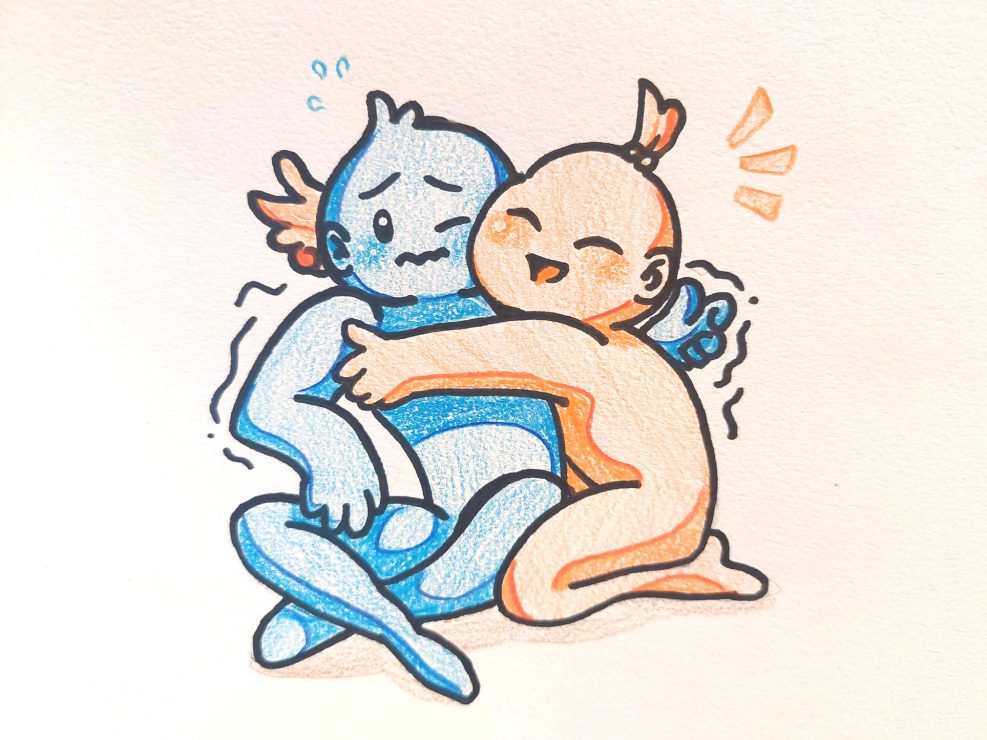And why I’m careful who I squeeze

Illustration by Sie Douglas-Fish.
Ah, the Board Game Café on bustling Yates Street in the heart of Victoria. Can you stand the excitement? Smells like popcorn, no? Bowls of buttered kernels overflowing next to towering eight-dollar milkshakes slurped down by couples playing colonial make-believe. Yes, it’s all a bit excessive. But it can make for a fun night if you squint a little.
However, I’m not here to talk about the milkshakes, or the popcorn, or the ass-kicking of capitalistic proportions that I meted out playing Ticket to Ride with the newly befriended couple my girlfriend and I went to the café with. Instead, I’m here to ruminate on the hugs (you heard me, the hugs) we exchanged at the end of the night with that couple.
Most goodbyes have an accompanying gesticulation: a wave, a nod, a regular handshake, a convoluted handshake of various slaps and bumps, or, maybe, a hug. So there we were, after a perfectly serviceable night of socializing, facing the rather important decision of how to say goodbye. I began, strategically, backing away slowly — smiling and affirming like an Avon rep at the end of a sales party.
“Thank you for coming! Let’s do it again soon, blah blah,” I enthused, when they stepped forward, arms outreached, eyes open wide like children looking for mommy’s embrace. The hugs were inescapable.
Now, I’m sure you’re asking: what’s the big deal? Why escape a hug from perfectly normal people, even friends? It’s simple. The hug, once exchanged between humans who may periodically encounter one another again throughout time and space, will set precedent for all future hellos and goodbyes — a sort of silent contract that, once consummated, will forever be the expectation. It’s tiresome, predictable, almost always unnecessary, and simply an obligation I’d rather avoid.
Please don’t misunderstand me, I’m no monster. The act of hugging in many situations is appropriate and sometimes even necessary. I think we can all agree that the hug in its current form — I mean without factoring in the more practical origins of the action (i.e., transferring body heat, showing a possible enemy both hands are empty and of no threat, keeping babies alive, etc.) — represents an acute feeling of care that only full physical embrace communicates sufficiently. For example, when my best friend’s grandmother passed, we hugged; when my brother told me he was having a son, we hugged; when my sister left her douchebag ex, hug.
However, the “problematic hug” manifests when it seeps into everyday interactions. To be fair, some people rely on the hug for its relative simplicity. Example: I recently ran into my hugging friend Cory at a pub down the street from my place. He, of course, hugged me immediately (even though we had just seen each other only a few days ago) and invited me to sit at the bar with him. After two glasses of a rather heavy IPA, I told him I had been thinking about the matter of hugging and wanted his opinion.
“The hug cuts out all the guesswork,” he said. “I don’t want to have to botch some college-bro or baseball handshake. I save the professional handshake for the office and hugs for my friends.” Okay, maybe a little manipulative towards the huggee, but fair enough.
Listen, I’m not here to take the hug away from anyone who finds it useful. And I know, I know, there’s research out there on how hugging can decrease stress, release the “cuddle hormone” Oxytocin, and may even reduce blood pressure (although, post-COVID, I wouldn’t necessarily be too promiscuous of a hugger, even if I did enjoy them).
My point is this: read the situation. Be a little goddamn discerning, or even selective for that matter! Because, sooner or later, we’re at risk of watering down the hug til it has no significance left to squeeze out.
But trust me, when a hug is warranted — when the situation calls for a genuine, big granddaddy, loving-ass hug — I promise, I give a good one.







